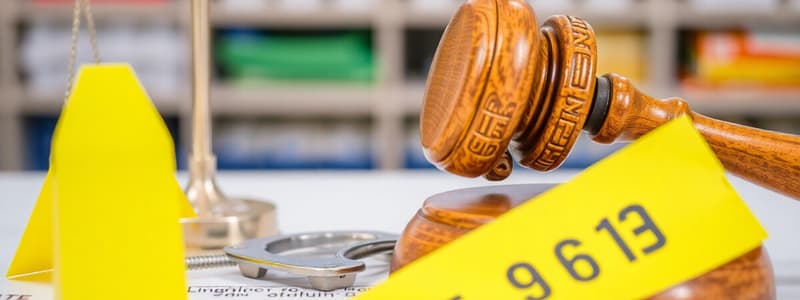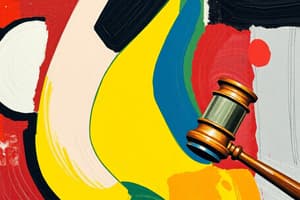Podcast
Questions and Answers
What does the Foreign Corrupt Practices Act prohibit?
What does the Foreign Corrupt Practices Act prohibit?
- Conducting business without financial records
- Accepting gifts from foreign officials
- Bribing foreign officials for beneficial contracts (correct)
- Engaging in public procurement processes
Which requirement is specifically included in the Foreign Corrupt Practices Act?
Which requirement is specifically included in the Foreign Corrupt Practices Act?
- Maintaining public records only
- Reporting bribes to the authorities
- Keeping detailed financial activity records (correct)
- Restricting transactions to cash only
What constitutes bankruptcy fraud?
What constitutes bankruptcy fraud?
- Failure to file for bankruptcy
- Evading the effects of federal bankruptcy law (correct)
- Offering bribes to bankruptcy judges
- Selling assets before bankruptcy filing
Which of the following is a violation related to insider trading?
Which of the following is a violation related to insider trading?
What is considered a federal crime under the Economic Espionage Act?
What is considered a federal crime under the Economic Espionage Act?
Which illegal activity is specifically related to organized crime?
Which illegal activity is specifically related to organized crime?
Which activity is associated with money laundering?
Which activity is associated with money laundering?
What does the Racketeer Influenced and Corrupt Organizations Act (RICO) prohibit?
What does the Racketeer Influenced and Corrupt Organizations Act (RICO) prohibit?
What must a tenant do after removing a cooler at the end of a lease?
What must a tenant do after removing a cooler at the end of a lease?
What is the most complete form of property ownership?
What is the most complete form of property ownership?
Which statement is true regarding a fee simple absolute ownership?
Which statement is true regarding a fee simple absolute ownership?
What happens to a fee simple property if the owner dies without a will?
What happens to a fee simple property if the owner dies without a will?
What is a potential consequence of using property in a way that interferes with others' rights?
What is a potential consequence of using property in a way that interferes with others' rights?
Which of the following statements correctly describes ownership interests in real property?
Which of the following statements correctly describes ownership interests in real property?
Which of the following can restrict an owner's use of their property despite having fee simple ownership?
Which of the following can restrict an owner's use of their property despite having fee simple ownership?
What occurs when only some rights from the bundle of property rights are transferred?
What occurs when only some rights from the bundle of property rights are transferred?
What distinguishes a joint tenancy from a tenancy in common?
What distinguishes a joint tenancy from a tenancy in common?
What happens to the joint tenancy if one joint tenant transfers their rights?
What happens to the joint tenancy if one joint tenant transfers their rights?
Which statement is true about tenancy by the entirety?
Which statement is true about tenancy by the entirety?
How does community property differ from joint tenancy?
How does community property differ from joint tenancy?
What occurs when a tenant by the entirety divorces?
What occurs when a tenant by the entirety divorces?
What can judgment creditors do in a joint tenancy?
What can judgment creditors do in a joint tenancy?
Which of the following is NOT a characteristic of joint tenancy?
Which of the following is NOT a characteristic of joint tenancy?
In which situation does a tenancy in common exist?
In which situation does a tenancy in common exist?
What is the primary requirement for establishing 'cause in fact' in a product liability case?
What is the primary requirement for establishing 'cause in fact' in a product liability case?
Which of the following statements accurately describes strict product liability?
Which of the following statements accurately describes strict product liability?
What does 'unreasonably dangerous' imply in the context of strict product liability?
What does 'unreasonably dangerous' imply in the context of strict product liability?
Which of the following is not a condition necessary for strict product liability as per Section 402A?
Which of the following is not a condition necessary for strict product liability as per Section 402A?
How does the concept of privity of contract relate to product liability?
How does the concept of privity of contract relate to product liability?
In strict product liability cases, what is the primary focus in determining liability?
In strict product liability cases, what is the primary focus in determining liability?
Which scenario could lead to a manufacturer being liable for misrepresentation?
Which scenario could lead to a manufacturer being liable for misrepresentation?
Why is it considered appropriate for manufacturers to bear costs associated with injuries from their products?
Why is it considered appropriate for manufacturers to bear costs associated with injuries from their products?
What must the government prove in the first phase of condemnation proceedings?
What must the government prove in the first phase of condemnation proceedings?
What is meant by 'just compensation' in the context of eminent domain?
What is meant by 'just compensation' in the context of eminent domain?
Which condition must property owners meet to retain their ownership rights?
Which condition must property owners meet to retain their ownership rights?
What does the process of inverse condemnation refer to?
What does the process of inverse condemnation refer to?
What must the court determine during the second phase of condemnation proceedings?
What must the court determine during the second phase of condemnation proceedings?
What is the overall purpose of eminent domain?
What is the overall purpose of eminent domain?
What happens if a property owner fails to pay debts?
What happens if a property owner fails to pay debts?
Which of the following is NOT a limitation of property ownership?
Which of the following is NOT a limitation of property ownership?
Flashcards are hidden until you start studying
Study Notes
Product Liability
- Plaintiff does not need a contract with the manufacturer to sue for negligence
- Plaintiff must prove the defendant’s conduct was the "cause in fact" and the proximate cause of the injury
- "Cause in fact" means the injury would not have occurred "but for" the defendant’s action
- A manufacturer can be liable for any intentional or reckless misrepresentations that cause injury to consumers or users of their products
Strict Product Liability
- Public policy supports strict product liability because:
- Consumers deserve protection from unsafe products
- Manufacturers should not escape liability for faulty products just because they lack a contract with the user
- Manufacturers are better equipped to bear the cost of injuries caused by their products
- Most states recognize strict product liability
- Requirements:
- The product must be defective when sold
- The defendant must be involved in the business of selling or distributing that product
- The product must be unreasonably dangerous due to its defect
- In most states, strict product liability only applies to personal injuries, not property damage
Crimes
- Foreign Corrupt Practices Act:
- Prohibits U.S. businesspersons from bribing foreign officials to secure contracts
- Prohibits bribery of foreign officials to influence their official actions for business opportunities
- Companies must keep detailed records to ensure accurate and fair representation of their financial activities
- Bankruptcy Fraud:
- Involves knowingly attempting to evade federal bankruptcy laws
- Insider Trading:
- Trading publicly traded securities based on non-public information that violates a duty owed to the company
- Theft of Trade Secrets and Other Intellectual Property:
- The Economic Espionage Act criminalizes stealing trade secrets and knowingly buying or possessing another’s trade secrets without authorization.
- Organized Crime:
- Operates illegally by providing illegal goods and services
- Traditionally involved with gambling, prostitution, illegal narcotics, counterfeiting, and loan sharking
- Now also includes credit-card scams and cybercrime
- Money Laundering:
- Involves engaging in financial transactions that conceal the source, identity, or destination of illegally gained funds through a legitimate business enterprise
- Racketeering (RICO):
- A federal crime to:
- Use income from racketeering activity to purchase an interest in an enterprise
- Acquire or maintain an interest in an enterprise through racketeering activity
- Conduct or participate in the affairs of an enterprise through racketeering activity
- Conspire to do any of the preceding activities
- A federal crime to:
Ownership and Other Interests in Real Property
- Ownership of property is an abstract concept that cannot exist without the legal system
- Ownership in real property is considered a "bundle of rights"
- Fee Simple: The most complete form of ownership; owner possesses the entire bundle of rights
- Life Estate: A person is granted ownership for their lifetime, with the property reverting to another upon death
- Leasehold Estates: Ownership of rights to occupy and use a property based on a lease agreement
- Ownership in Fee Simple Absolute:
- Owner has the most complete aggregation of rights and privileges
- Owner can give away or dispose of the property by deed or will
- Ownership is potentially infinite in duration
- Owner has exclusive possession and use rights
Joint Tenancy
- Two or more persons own an undivided interest in the property
- Upon a joint tenant's death, their interest passes to the surviving tenant(s)
- Right of Survivorship: The right of surviving joint tenants to inherit a deceased joint tenant's ownership interest
- Termination of Joint Tenancy:
- Can terminate through sale or gift of interest by one joint tenant
- Can terminate if an interest is levied against (seized by court order) to satisfy a tenant's judgment creditors
Tenancy by the Entirety
- Shared ownership of real property by married persons
- Neither spouse can separately transfer their interest during their lifetime without consent from the other spouse
- Terminated by divorce, death of a spouse, or mutual agreement
Community Property
- Some states allow married couples to own property as community property
- Each spouse technically owns an undivided one-half interest
- Most property acquired during the marriage is considered community property
Limitations on the Rights of Property Owners
- Property ownership isn't absolute, and all owners are subject to limitations
- Payment of property taxes is required
- Zoning laws and building permits restrict property usage
- Property can be seized to satisfy judgment creditors
- Eminent Domain:
- The government has the right to acquire possession of real property for public use
- Also known as the condemnation power of government or a "taking"
- Government must pay just compensation for the land
- Condemnation Proceedings:
- First phase establishes the government's right to take the property
- Second phase determines the fair value of the property
- Government must prove that taking is for public use
- Just Compensation: Fair value is generally equal to the market value of the property
- Inverse Condemnation:
- Occurs when a government action affects a property owner's use and enjoyment of their property without formal condemnation proceedings
- The owner can sue to seek "just compensation" for the diminished value of the property
Studying That Suits You
Use AI to generate personalized quizzes and flashcards to suit your learning preferences.




